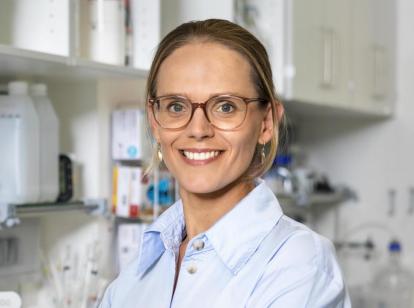After the doctorate – An interview with Laura De Laporte
After successfully obtaining a degree and a doctorate, many graduates are torn about where to go next. In this interview, Prof. Dr-Ing. Laura De Laporte talks about her doubts after the doctorate, her own experiences and gives advices which can help with orientation.
At the end of their doctorate, many young scientists ask themselves "What now? - Continue to push the own research or gain new insights in industry?". What would you advise young people to do and what helped you to make this decision?
"In the best case, you have already dealt with this question again and again during your doctorate. However, I also found myself unable to answer it unequivocally after completing my doctorate. Doubts arose, even though I had an affection for a scientific career. In my opinion, working as a postdoc is a good first step. The new impressions - especially when you have changed location and leave your familiar surroundings behind - help in the decision-making process. I found it to be another orientation phase in which my feeling for a scientific career became stronger. Of course, there is also a bit of luck involved and it depends on how comfortable you feel in your new research group and how much freedom you get to grow. Nonetheless, what you should not forget if you realize that it is not the right thing after all: this decision is not final. You can still switch to industry during or after a postdoc."
How can postdocs pursue their advancement to working group leadership, and what should they be prepared for?
"An important quality that you have to bring with you: You should be realistic and able to critically question yourself. There are only a limited number of working group leader positions and even fewer professorships. So the competition is correspondingly tough. You have to ask yourself the question: Do I have good, innovative ideas that stand out? From a scientific point of view, this is really the biggest challenge, because you need good ideas in order to acquire grants and write publications. That's the only way you can really have an effective impact in your scientific field. Alternatively, there are professorships in Germany that focus more on teaching. So it also depends on what your heart beats for. Once you have decided, you have to be prepared to write a lot of proposals. It is important to keep an eye on your environment - both competing projects and potential partners. I think it is essential to build up a good network and to link your own topics with others - also interdisciplinary. This is how you actively bring your research to the attention of your colleagues. In summary, this question can be answered quite easily: Be proactive - I always advise my doctoral students to do the same."
What support can those interested in such a position at the DWI count on and what has been your personal experience?
"Having started at the DWI myself as a junior research group leader, I can personally say that I have found it to be a springboard for my career. On the one hand, general funding is an essential basis, and on the other hand, you receive active support. Since we are a relatively small institute, there are also more direct ways of communication: although you are not part of the scientific board, you are involved in many topics and can participate in discussions in the professorial board. In addition, you will be well prepared to apply for renowned funding and grants and will receive support from experienced colleagues. Another advantage is that you benefit from the networks and consortia of the scientific management. You get actively involved in them and suggested for potential collaborations - not only local, but also international."
Why do you think the DWI is a good place to advance your scientific career?
"On the one hand, the DWI is closely linked to the Excellence University RWTH in many aspects, including the fact that all DWI professors are appointed jointly with RWTH Aachen University. This means that as research group leaders, we can benefit from the university networks and consortia. However, because the DWI is a non-university research institution and part of the Leibniz Association, we have opportunities that a university alone cannot offer. Besides certain funding programs, these include a stronger focus on interdisciplinarity and international projects as well as programmatic freedoms.
Furthermore, as part of the Leibniz Association, we also benefit from its networks and activities. These include, for example, the research network "Leibniz Health Technologies" and funding programs of the Leibniz competition, such as the Leibniz Female Professors Program, with whose support I obtained my professorship.
In addition, we are very central and well positioned in Europe. We are closely connected with our cooperation partners in Belgium and the Netherlands, which is a great advantage for European projects. The geographical proximity allows us to visit and collaborate with other labs in a very short time to exchange materials, demonstrate methods or just drop by for a project meeting, and I appreciate that very much."

